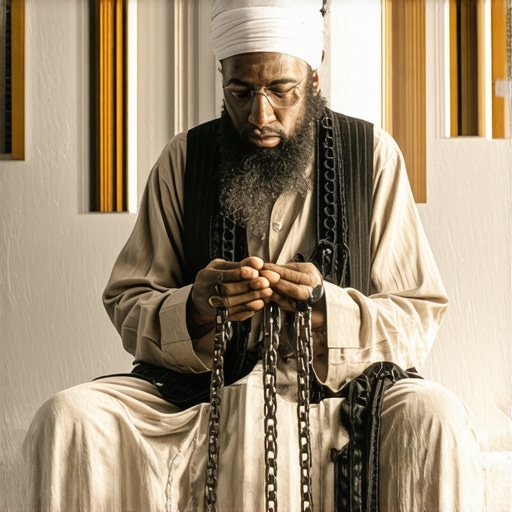When Feet Are Bound in Sleep: A Dream or a Divine Whisper?
Ever woken up in a sweat, questioning the cryptic symbols your subconscious threw at you? Dreaming of feet being chained in Islam isn’t just a bizarre nighttime episode—it’s a sacred warning, a spiritual message packed with profound insights. As a columnist who’s delved into the labyrinth of Islamic dream interpretations, I can tell you—these dreams are more than just night-time narratives; they’re divine whispers urging us to reflect on our spiritual state.
Unraveling Sacred Symbols: Why Feet and Chains?
In Islamic dream symbolism, feet often symbolize one’s journey through life, stability, or even one’s faith in divine guidance. When they’re chained, it signals restrictions—perhaps sins, doubts, or external forces holding us back from spiritual progress. The chains, in this context, are not mere physical restraints but divine warnings about spiritual stagnation or impending hardships that require our attention and action.
Could Dreaming of Chained Feet Be a Wake-Up Call?
Absolutely! Such dreams are akin to a spiritual alarm bell. They beckon us to examine what’s anchoring us down—be it negative habits, unfulfilled duties, or unresolved conflicts. The Islamic perspective encourages believers to interpret these dreams as opportunities for self-purification and divine re-evaluation, aligning with teachings from Ibn Sirin, a revered figure in Islamic dream interpretation.
What Does the Chains on Your Feet Say About Your Spiritual Path?
Well, it could be a hint that your spiritual journey is hindered by doubts or sins you’ve overlooked. Islam teaches us that dreams serve as divine messages, guiding us away from missteps. If you find yourself dreaming of chained feet, consider it an invitation to seek forgiveness, increase your worship, and reconnect with your faith. Remember, divine guidance often appears in symbols, waiting for us to decode them with sincerity and reflection.
Is There a Way to Break Free from These Dream Symbols?
Indeed! Islamic teachings emphasize that sincere repentance and prayer can break spiritual chains—both in dreams and reality. Contemplating your dreams, seeking knowledge, and making sincere du’a (prayer) are powerful tools for liberation. Sometimes, the chains in your dreams mirror internal struggles that need spiritual healing—not external solutions alone. As always, consulting with a knowledgeable Islamic scholar can shed light on personal interpretations and steps forward.
If you’re curious about other dream symbols and their spiritual meanings, exploring related topics like dreams about losing teeth or dreams of animals can expand your understanding of divine messages in your sleep.
So, next time you see your feet chained in a dream, don’t dismiss it as mere fantasy. It’s a sacred call—a divine nudge to reflect, repent, and renew your spiritual voyage. Share your thoughts or dreams below—after all, dreams are divine messages waiting to be interpreted!
Are Chains in Dreams a Divine Call for Spiritual Liberation?
Dreaming of chains or restraints in Islam isn’t solely a nightmarish image; it’s often a sacred message from the divine realm, urging us to reflect on our spiritual state. Such dreams serve as divine signals, highlighting areas where we might be spiritually confined or held back, whether by sins, doubts, or external influences. These visions are invitations to embark on a journey of self-awareness and spiritual cleansing.
The Symbolism of Chains in Islamic Dream Interpretation
In Islamic symbolism, chains typically represent obstacles—those that impede our faith, progress, or inner peace. When these chains appear in dreams, they may symbolize personal sins, unfulfilled obligations, or external pressures that restrict our spiritual growth. Understanding these symbols requires diving into the depths of Islamic dream interpretation, which emphasizes divine messages conveyed through vivid symbols. For example, Islamic scholars like Ibn Sirin have extensively discussed such symbols, urging believers to interpret dreams as messages from Allah.
Could Dreaming of Being Chained Signal a Call to Action?
Absolutely! This dream motif often acts as a wake-up call, prompting believers to evaluate what binds their spiritual progress. Are you neglecting prayers? Carrying unresolved conflicts? Or perhaps caught in negative habits? Recognizing these dream symbols as divine warnings empowers us to take corrective action—seeking forgiveness, increasing worship, and reconnecting with our faith. Islamic teachings emphasize that sincere repentance and prayer can break the chains—both in dreams and in real life—facilitating spiritual freedom and inner peace. Exploring how dreams relate to our waking life can be enlightening, especially when guided by authentic sources like our dream dictionary.
What Practical Steps Can Help Us Break Free from these Spiritual Chains?
Engaging in sincere du’a (prayer), performing regular istikhara (guidance prayer), and seeking knowledge about Islam are practical ways to dissolve spiritual barriers. Moreover, self-reflection and repentance are powerful tools for internal liberation. Remember, dreams are often a mirror reflecting our inner state, so addressing these issues in waking life aligns with divine guidance. Consulting with a knowledgeable Islamic scholar can provide personalized insights, ensuring that your spiritual journey remains authentic and effective. For a deeper understanding of how dreams symbolize divine messages, you might find it helpful to explore dream symbolism and spiritual lessons.
If you’ve experienced dreams of chains or other symbols of restriction, share your thoughts or ask questions below. Your experiences can resonate with others and foster a collective reflection on divine messages in dreams. Remember, every dream carries a sacred meaning—waiting for us to interpret and act upon it.
Decoding the Sacred Language of Dreams: The Complex Symbolism of Chains in Islamic Mysticism
When exploring the realm of Islamic dream interpretation, chains symbolize more than mere physical restraints; they embody spiritual obstacles, societal burdens, and internal conflicts that hinder our divine connection. These symbols are not arbitrary but are deeply rooted in classical Islamic scholarship, which emphasizes the importance of understanding dreams as messages from Allah, often conveyed through vivid, layered imagery.
In the context of Islamic spirituality, chains frequently represent sins, unfulfilled obligations, or external pressures that entangle the soul. For example, dreams of being bound or restrained by chains may serve as a divine call to confront personal shortcomings—be it neglecting prayers, harboring resentment, or succumbing to worldly temptations. Recognizing these symbols as divine messages urges believers to undertake sincere repentance and seek Allah’s forgiveness, which, according to authentic Hadiths, can dissolve spiritual bonds (Sahih Muslim, Book 35, Hadith 6512).

From Dream to Reality: Practical Steps for Spiritual Liberation through Islamic Teachings
Transformative power lies in the application of Islamic principles to interpret and respond to these dream symbols. Engaging in heartfelt supplication (dua), performing regular acts of worship, and seeking Islamic knowledge are fundamental steps for breaking spiritual chains. The Prophet Muhammad (peace be upon him) emphasized the significance of supplication as a means of seeking Allah’s aid in overcoming difficulties, including those manifested in dreams.
Furthermore, the concept of tawbah (repentance) is central. The Qur’an states, “And turn to Allah in repentance, all of you, O believers, that you might be successful” (Surah An-Nur, 24:31). This act of turning back to Allah with sincerity can purify the heart and dissolve the chains that bind the soul, both in dreams and waking life.
To deepen your understanding of how dreams serve as spiritual guides, consider exploring scholarly works such as Interpretation of Dreams in Islam by Dr. Muhammad Al-Akili, which offers nuanced insights into dream symbolism and practical responses rooted in Islamic theology. Remember, every dream is an opportunity for spiritual growth—if we are willing to interpret and act upon its divine messages.
Are you ready to delve deeper into the mysteries of your dreams? Engage with knowledgeable Islamic scholars or trusted sources to refine your understanding and enhance your spiritual journey. Sharing your experiences and questions can also foster a community rooted in faith and mutual enlightenment.
Deciphering the Nuances: How Do Islamic Scholars Interpret Chains as Symbols of Inner Struggle?
Islamic scholars have long emphasized the layered symbolism behind dreams, especially those involving chains. These symbols often point to internal struggles—struggles with faith, patience, or moral dilemmas—that may not be apparent in waking life. According to renowned Islamic dream interpretation experts like Ibn Sirin, chains symbolize the bonds of unresolved sins or lingering doubts that hinder spiritual growth. Recognizing these symbols allows believers to confront their hidden burdens with sincerity and divine help, fostering a profound process of self-awareness and purification.
What Are the Advanced Techniques for Interpreting Dreams of Restraint in a Spiritual Context?
Advanced dream interpretation in Islam involves a holistic approach—considering the dreamer’s current spiritual state, recent life events, and emotional triggers. Scholars recommend keeping a dream journal to identify recurring motifs like chains and correlating these with personal actions or feelings. Furthermore, engaging in Tafsir Al-Ahlam, or sacred dream interpretation, advises seeking divine guidance through sincere supplication and reflection. Such practices help unlock deeper meanings and facilitate targeted actions—like repentance or increased worship—to break free from spiritual constraints.
How Can Sincere Repentance Dissolve the Chains of Spiritual Bondage?
Sincere tawbah (repentance) is a cornerstone in Islam for overcoming spiritual affliction, including the symbolic chains seen in dreams. The Qur’an states, “And turn to Allah in repentance, that your hearts may be purified” (Surah An-Nur, 24:31). This act of heartfelt remorse, combined with firm resolve not to repeat past mistakes, can lead to divine forgiveness that spiritually unshackles the soul. Ritual acts like performing wudu (ablution) and praying Salat al-Tawbah (repentance prayer) reinforce this process. Such spiritual disciplines, rooted in authentic Islamic teachings, are powerful in dissolving the metaphorical chains that impede progress, bringing inner peace and renewed faith.
What Role Do External Influences Play in Dreams of Spiritual Restraint?
External influences—such as societal pressures, toxic relationships, or unfulfilling environments—can manifest in dreams as chains or restraints, symbolizing external forces that restrict spiritual development. Recognizing these influences allows believers to assess and modify their surroundings, seeking environments conducive to faith and spiritual growth. Islamic teachings advocate for spiritual discernment to differentiate divine messages from external distractions. Practical steps include establishing boundaries, engaging in community worship, and seeking knowledge to fortify oneself against negative externalities. This proactive approach aligns with the prophetic tradition of seeking divine guidance in all aspects of life, including dreams.
How Do We Balance Dream Interpretation with Daily Spiritual Practices?
Balancing the insights gained from dreams with daily Islamic practices involves integrating reflection, prayer, and action. After interpreting a dream about chains, believers are encouraged to perform specific supplications and increase acts of worship—such as reading Qur’an, giving charity, or performing voluntary prayers. Consistency in spiritual routines ensures that dream messages serve as catalysts for ongoing self-improvement rather than isolated incidents. Engaging with knowledgeable scholars or trusted Islamic resources can further deepen understanding and reinforce the connection between subconscious symbols and conscious efforts for spiritual enhancement.
If you have experienced dreams of chained feet that resonate deeply, share your insights or questions below. Your journey can inspire others to interpret divine messages and pursue spiritual liberation with renewed faith and clarity.
Expert Insights & Advanced Considerations
1. The Significance of Internal Struggles in Dream Symbols
Dreams of chained feet in Islam often symbolize internal spiritual conflicts such as doubts, sins, or moral dilemmas that hinder personal growth. Recognizing these internal barriers allows believers to undertake sincere repentance and seek divine guidance, transforming dreams into catalysts for self-improvement and spiritual elevation.
2. The Role of External Influences on Dream Content
External factors like societal pressures or toxic relationships may manifest as chains in dreams, indicating environmental obstacles to spiritual progress. Experts recommend evaluating one’s surroundings and engaging in community-based worship to mitigate external impediments, aligning waking life with divine principles.
3. The Power of Sincere Repentance and Spiritual Purification
Sincere tawbah (repentance), combined with acts of worship like prayer and charity, can dissolve spiritual bonds represented by chains in dreams. This process reinforces the Islamic view that inner purification directly influences dream symbolism, leading to inner peace and divine favor.
4. Advanced Techniques for Dream Interpretation
Utilizing dream journals, engaging in istikhara, and consulting authentic Islamic scholars are advanced methods to decode dreams of restraint. These practices deepen understanding and foster targeted actions, ensuring that dream messages translate into tangible spiritual progress.
5. The Interplay Between Dreams and Daily Spiritual Practices
Maintaining consistency in Qur’an recitation, prayer, and dhikr ensures that dream symbolism informs ongoing spiritual routines. By integrating dream insights into daily worship, believers can enhance their spiritual resilience and responsiveness to divine messages.
Curated Expert Resources
- Islamic Dream Interpretation by Ibn Sirin: A foundational text offering layered meanings of dreams, including chains as symbols of spiritual bondage.
- Al-Azhar Islamic Scholars’ Publications: Authoritative resources providing contemporary insights into dream symbolism and spiritual psychology.
- Online Islamic Dream Dictionaries: Interactive tools with contextual explanations for interpreting dreams related to chains, confinement, and liberation.
- Scholarly Articles on Dream Symbols and Inner Struggle: Peer-reviewed studies exploring the psychological and spiritual dimensions of dream symbolism in Islam.
Final Expert Perspective
Dreaming of feet being chained in Islam is a profound spiritual signal, often pointing to internal struggles or external barriers obstructing one’s faith journey. Recognizing this symbolism empowers believers to undertake sincere acts of worship, reflection, and self-purification. As experts in Islamic dream interpretation emphasize, these dreams serve as divine messages urging us to confront and dissolve our spiritual constraints. Engaging with authentic resources and consulting knowledgeable scholars can transform these nocturnal signs into steps toward greater faith and inner freedom. For those eager to deepen their understanding, exploring dreams about losing teeth or dreams of animals can offer further spiritual insights. Your dreams are sacred messages—embrace them with sincerity, and let them guide your spiritual evolution.


